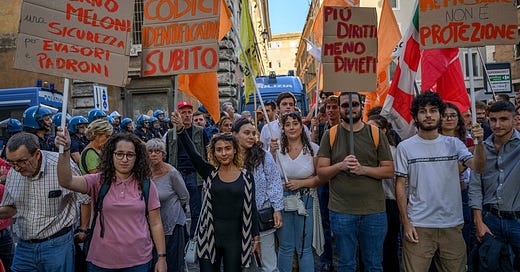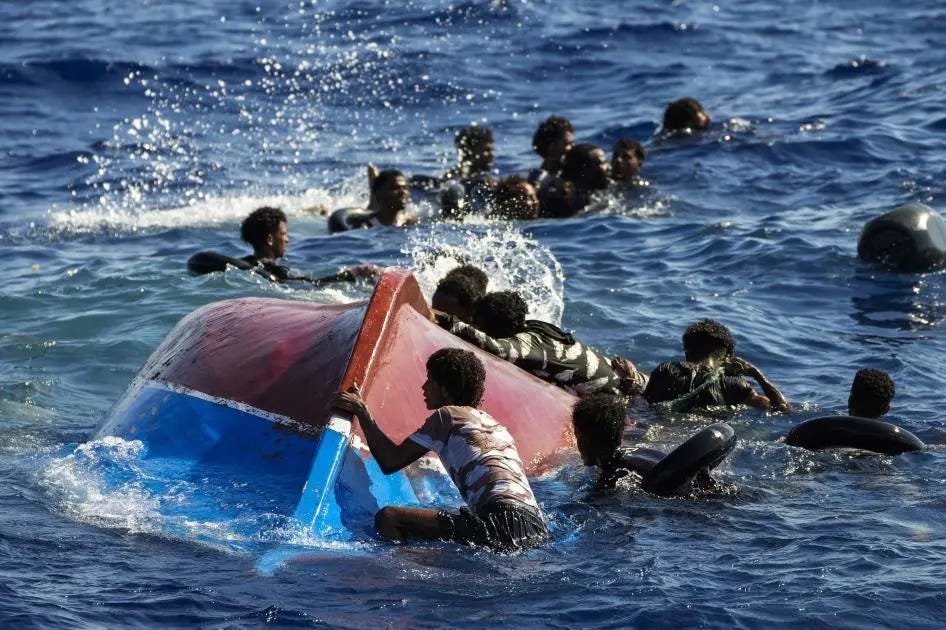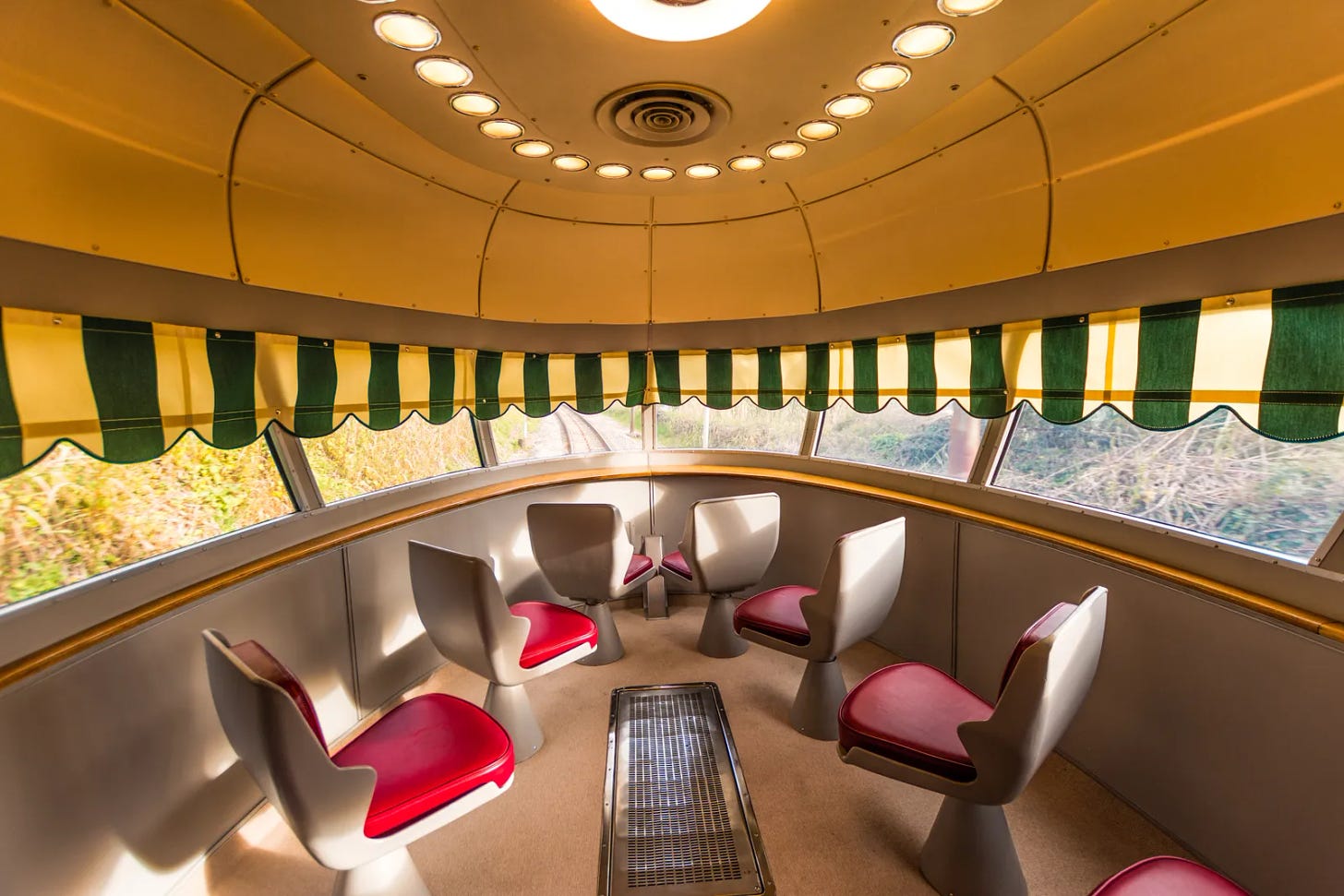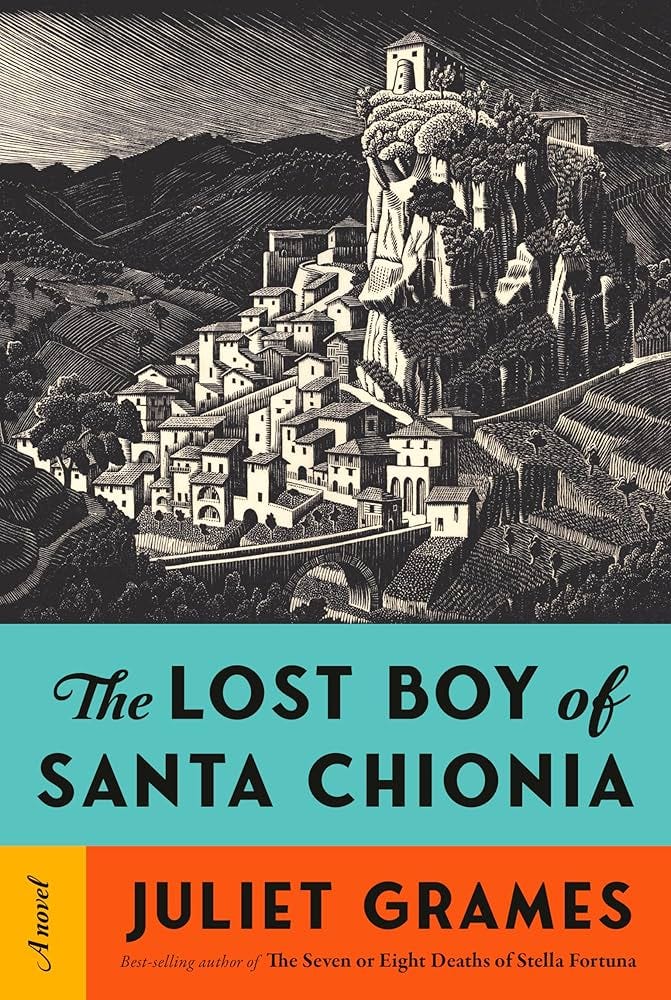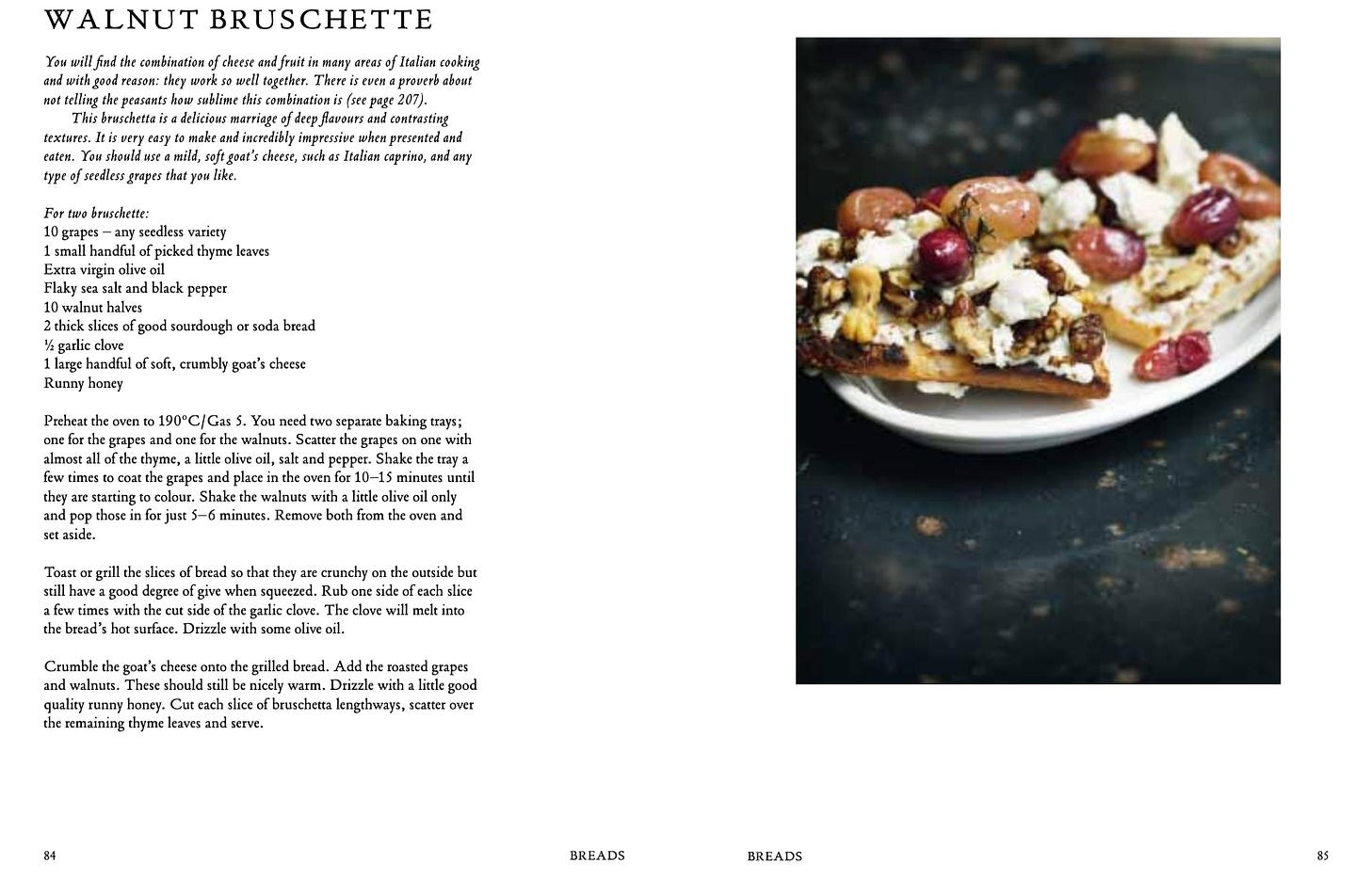The Meloni government’s long term project to dismantle the nation’s civil rights continued to accelerate this week. Last Monday, the Italian Parliament began debating a new security bill which among other things seeks to increase fines and judicial sentences for activists. If the bill passes — and it has already passed through the first chamber — those who block roads will face 300 euro fines, those who target critical infrastructure (such as the long-contested TAV high speed train line) will face 1000 euro fines, and those who engage in passive resistance such as hunger strikes could face as much as five years in prison. Looking at the list of proposals it’s clear these measures are targeted particularly at climate activists and migrant groups, who most often deploy such tactics. There’s no specific note on neofascist organisations, for example, who patrol the streets in armed bands, or other far-right groups who so often engage in hate speech and other forms of symbolic violence. This is an outrage. As Angelo Bonelli, the leader of the Green- Left Alliance, has put it: “If this authoritarian measure is approved by the senate, the government will be able to arrest and ‘silence’ workers who protest against losing their job, and any young activist who fights against social, environmental and ecological injustices… We’re facing an authoritarian and freedom-killing drift that cannot leave us indifferent. Protesting is a civil duty.”
It’s not just protesters that will soon face the growing wrath of the current administration. NGOs rescuing refugees in the central Mediterranean have also been targeted with new legislation. It’s no secret that the border question is dear to Meloni: she’s campaigned about irregular migration for years, she’s made deals with African countries to tackle people traffickers, built new detention centres in Albania and increased funding for processing centres. As a result, migrant arrivals to Italy have reduced by 60% over the past year alone; a stat that has gained her praise from all number of leaders from Victor Orban to Kier Starmer and even, most recently, Elon Musk. Now, with this new decree, she is seeking to tackle the rescue operations themselves: as of next week, NGOs will be required to coordinate all actions in dialogue with the Italian authorities and could face fines of 10.000 euros for rescuing people without prior approval. This might well be an efficient system, but it’s also a grim policy that treats people as numbers, which takes no account of the Law of the Sea and which neglects the human right of anyone on the planet to find a safe haven away from poverty and violence. For more ENG language info check out this piece in Politico.
CN traveller published an interesting if somewhat indulgent piece this week by Charlie Hobbs as part of their ‘special train journeys’ spotlight feature series. In the article Hobbs narrates his experience aboard the Arlecchino (the Harlequin); an enigmatic train which architect Gio Ponti designed for the 1960s Rome Olympics. The train itself is a weird construction indeed: split into coloured zones of red, blue, green and gold carriages which each signpost a different function. Since 2015 FS Italia has been renovating the carriages and now the full service is back up and running for private clients, at an eye watering cost. The good news is the train will also embark on a few public journeys each year. The next one departs from Milan to Genoa on 3 November, so keep an eye on the FS website and social media if you’re interested in buying a ticket. Here’s the link to Hobbs’s full piece.
Arts and culture: Murder Mysteries
Last week the BBC announced a new three-part drama documentary series Renaissance: The Blood and the Beauty which will apparently tell the story of the creative relationship between three of the eras most well known artists: Leonardo Da Vinci, Michelangelo and Raphael. The genre of ‘drama documentary’ is a funny one, but it does make sense in this particular case. Because while there are plenty of rumours and anecdotes about the relationship between these well-known figures, the actual historical record is pretty scant. To solve the enigma the show’s creators claim to have “worked the story out” by collaborating with curators and art historians at the National Gallery in London who in turn claim to have found coded evidence of friendships and rivalries in some of the artists’ paintings and sketches. Critics are already calling this ‘the new Wolf Hall’ which seems premature… still, whatever the result, it’s sure to be an exciting work of historical fiction and worth keeping on your radar.
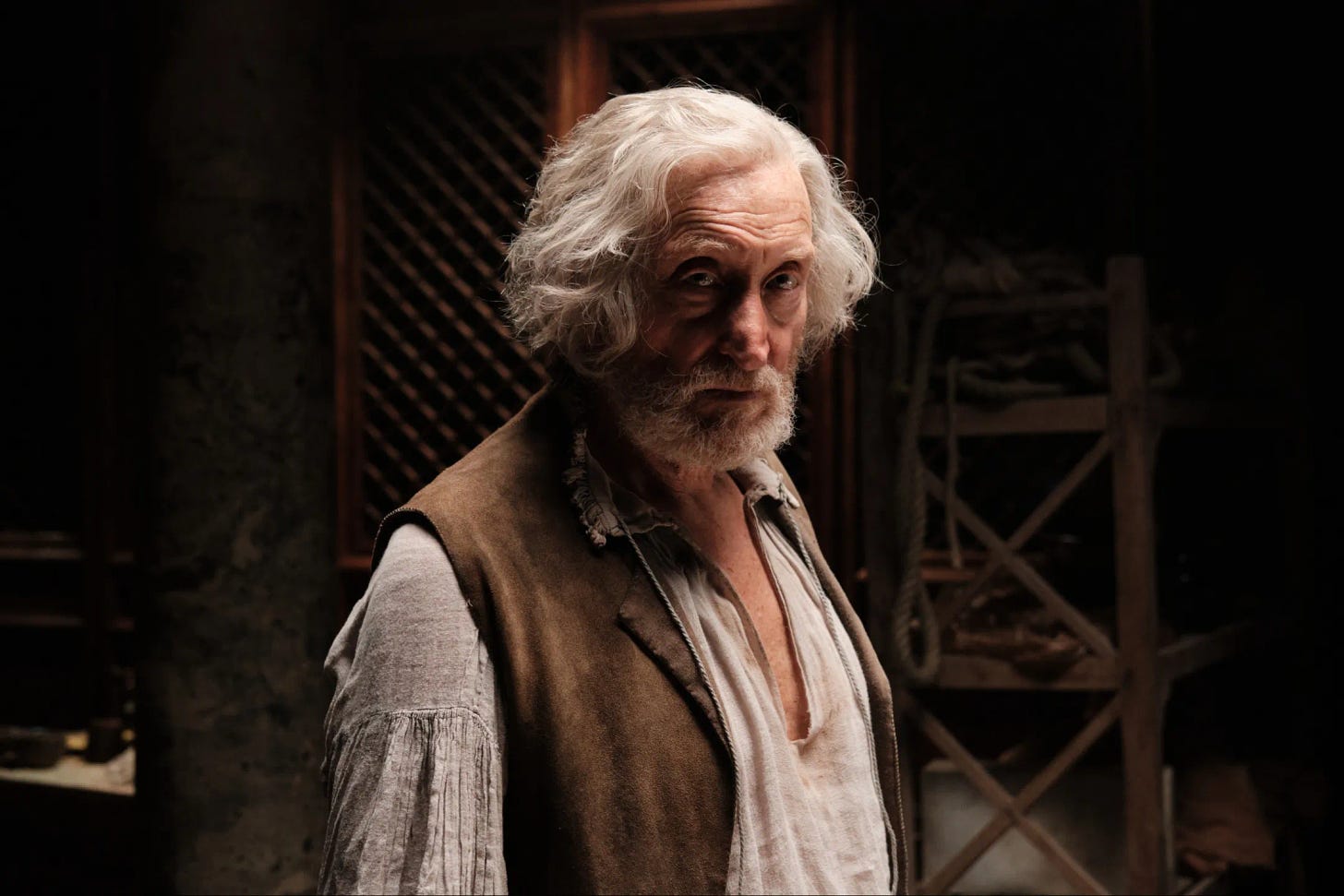
With the notable exception of Umberto Eco’s masterpiece The Name of the Rose I am not usually a big fan of detective fiction. I tend to find myself frustrated by the formulaic, all too predictable narrative structures and stock characters; the stale beats and cliched finales. This week, however, as I return from an exhausting but productive few days in Athens, I plan to make an exception to read Juliet Grames’s new novel The Lost Boy of Santa Chionia which follows the story of Francesca Loftfield, “a twenty-seven-year-old, starry-eyed American” who finds herself embarking on an amateur detective mission in an isolated mountain village in Calabria. The book describes itself as “a suspenseful puzzle mystery, a captivating romance, and an affecting portrait of a young woman in search of a meaningful life,” which is just what I need right now, and — who knows? — perhaps that’s the case for you too.
Recipe of the week: goat's cheese, roasted grape & walnut bruschette
This is one of my all-time favourite autumn crostini. The recipe comes from Russell Norman’s book Polpo, which, for all its deviance from strict tradition, is a lovely compendium of Venetian cicchetti, street food and a few fancier restaurant dishes. The mix of flavours here, of mild soft, savoury cheese, sweet fruit and the slight bitterness and crunch of the toasted walnuts make for a wonderful marriage. I like to serve this nibble alongside an ice gold glass of prosecco as a pre-dinner aperitivo, though it also works well with a simple green salad, or cabbage salad, for a fresh midweek lunch with friends. So Here’s the link.
.
I’m Jamie Mackay, a UK-born, Italy-based writer, working at the interfaces of journalism, criticism, poetry, fiction, philosophy, travelogue and cultural-history. I set up ‘The Week in Italy’ to make a space to share a regular overview of the debates and dilemmas, innovations and crises that sometimes pass under the radar of our overcrowded news feeds, to explore politics, current affairs, books, arts and food. If you’re a regular reader, and you enjoy these updates, I hope you’ll consider becoming a supporter for EUR 5.00 per month. I like to think of it as a weekly catch-up chat over an espresso. Alternatively, if you’d like to send a one-off something, you can do so via PayPal using this link. Grazie!

